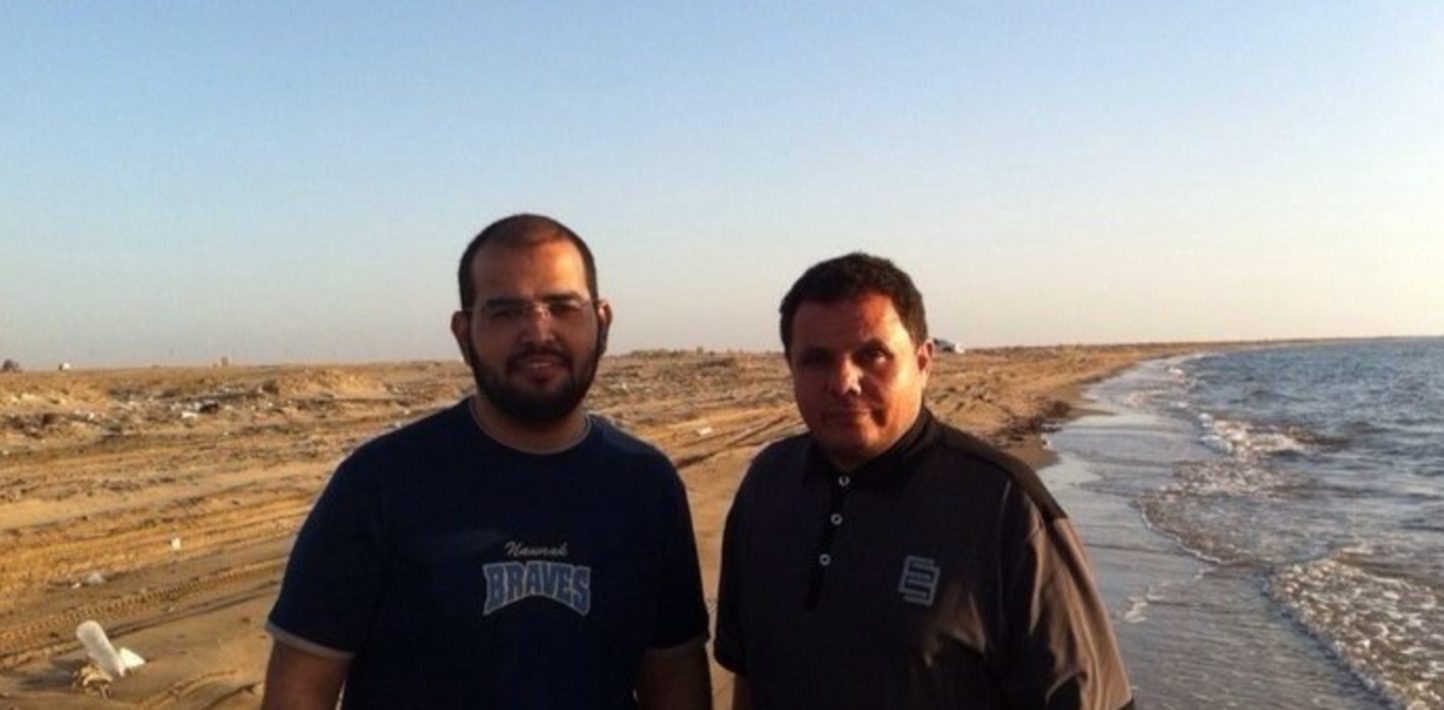Photo: Issa al-Hamid, right, with Abdulaziz al-Shubaily, left, fellow founding member of the Saudi Civil and Political Rights Association (ACPRA)
The sentencing of human rights activist Issa al-Hamid to nine years in prison and a travel ban of equal duration is the latest evidence of the Saudi Arabian authorities’ resolve to continue their ruthless onslaught against civil society in the Kingdom, said Amnesty International.
Issa al-Hamid is a founding member of the Saudi Civil and Political Rights Association (ACPRA), an independent human rights organization. The majority of its founding members are currently serving lengthy prison terms for their peaceful human rights activism and calls for reform.
“The Saudi Arabian authorities’ ruthless quest to eradicate any last vestige of dissent continues unabated with the conviction of Issa al-Hamid. He is a courageous activist whose only ‘crime’ has been to promote human rights in the Kingdom,” said James Lynch, Deputy Director for the Middle East and North Africa Programme at Amnesty International.
This sentence sends a chilling message that the Saudi Arabian government will not relent in its assault on freedom of expression until it has squeezed every last drop of life out of an embattled civil society. Issa al-Hamid’s verdict must be quashed immediately and he must be released unconditionally.
James Lynch, Deputy Director for the Middle East and North Africa Programme at Amnesty International
“This sentence sends a chilling message that the Saudi Arabian government will not relent in its assault on freedom of expression until it has squeezed every last drop of life out of an embattled civil society. Issa al-Hamid’s verdict must be quashed immediately and he must be released unconditionally.”
He was convicted by Saudi Arabia’s Specialized Criminal Court (SCC), a secretive counter-terror court that has been increasingly used by the authorities to sentence human rights defenders and other peaceful dissidents to lengthy prison terms, after grossly unfair trials and often under the guise of fighting “terrorism”.
The court convicted him on a long list of charges including “inciting [people] to breach public order”, “defaming the Council of Senior Religious Scholars”, “insulting the judiciary”, “setting up an unlicensed organization”, communicating false information to undermine the “image of the state” and “violating the Anti-Cyber Crime law”.
The charges relate to a series of statements and articles published online in which he spoke out about a range of issues including the right to demonstrate, calling for the King to order an investigation into human rights abuses by Saudi Arabia’s Ministry of Interior and highlighting the harassment of families of political prisoners by the same ministry.
His two brothers Dr Abdullah al-Hamid and Dr Abdulrahman al-Hamid – also founding members of ACPRA – have similarly been targeted for their human rights work. They are currently serving 11 and nine year prison sentences respectively for their peaceful activism. Dr Abdullah al-Hamid was imprisoned in March 2013 along with Dr Mohammad al-Qahtani, also a founding member of ACPRA, when the authorities ordered the shutdown of the organization.
Another ACPRA member, the 80-year-old former judge Sheikh Sulaiman al-Rashudi was arrested in 2012 two days after he gave a talk on the legality, under Shari’a law, of peaceful protests and is currently serving a 15-year prison sentence. Other ACPRA founding members behind bars include Dr Abdulkareem al-Khoder, Fowzan al-Harbi, and Mohammed al-Bajadi, who recently was transferred to a “rehabilitation center” designated for “terrorists” after having finished serving his four-year prison term.
“The Saudi Arabian authorities appear intent on silencing the members of ACPRA, and all other human rights defenders one by one, as part of a ruthless campaign of persecution to wipe out all trace of dissent,” said James Lynch.
“This systematic pattern of cracking down on peaceful activists in the name of fighting terror, seems to be intended to terrorize and punish anyone who exposes gross human rights violations that the authorities are intent on hiding from the world”.
Like Issa al-Hamid, many ACPRA members and other human rights defenders’ convictions have included the offence of founding “unlicensed organizations”. This is because for seven years the authorities had failed to pass a law of associations, even though a draft of the law was approved by the Shura Council in 2008.
In November 2015 Saudi Arabia’s authorities finally passed a new law of associations which was largely drawn from the 2008 draft law. The new law however is more restrictive than the 2008 draft, as it grants the Ministry of Social Affairs sweeping, discretionary powers including the power to deny licences to new organizations and to disband them if they are deemed to be “harming national unity”. All references to “human rights organizations”, that were in the 2008 draft, have been removed.


